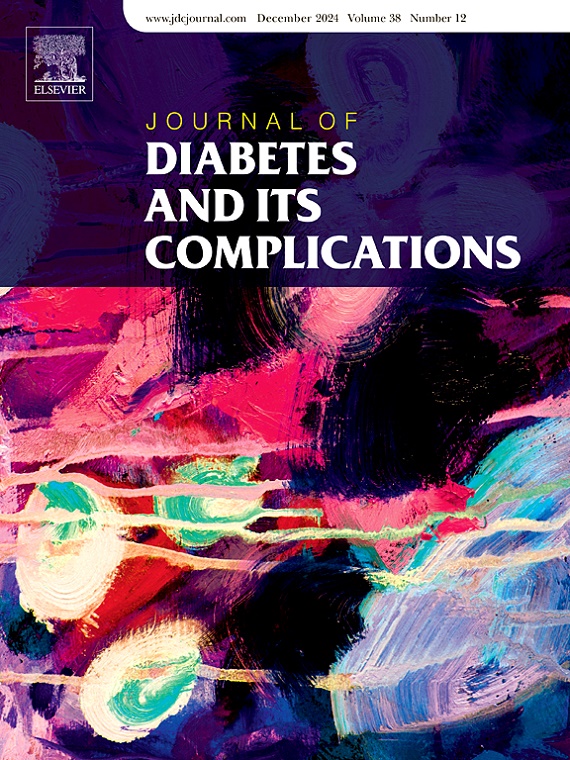Predicting the impact of stress-induced hyperglycemia on in-hospital mortality in patients with chronic kidney disease and acute coronary syndrome: A retrospective study
IF 3.1
3区 医学
Q3 ENDOCRINOLOGY & METABOLISM
引用次数: 0
Abstract
Background
Stress hyperglycemia is prevalent in critical illnesses and has been associated with adverse short- and long-term outcomes in individuals with acute coronary syndrome (ACS). However, there is limited evidence for the predictive value of stress hyperglycemia and hospitalization mortality in patients with chronic kidney disease (CKD) and ACS. This study aimed to explore the association between hospitalized mortality, stress hyperglycemia ratio (SHR), and admission blood glucose (ABG) in patients with CKD and ACS.
Methods
This study included 655 hospitalized patients who were diagnosed with ACS and CKD. Patients with incomplete data were excluded, resulting in the analysis of 550 patients. The primary outcome measured was in-hospital mortality.
Results
The median age of the cohort included in the analysis was 71 years, with a male proportion of 66.2 %, and a mean estimated glomerular filtration rate (eGFR) of 27.8 mL/min/1.73 m2. Patients classified as having stage 3, stage 4, and stage 5 chronic kidney disease (CKD) comprised 46.9 %, 17.1 %, and 36.0 % of the population, respectively. The overall in-hospital mortality rate was 10.7 % (n = 59). Both SHR (OR = 2.67; 95 % CI 1.51–4.74; p < 0.001) and ABG (OR = 1.09; 95 % CI 1.04–1.14; p < 0.001) were significantly associated with in-hospital mortality in CKD and ACS patients. SHR and ABG showed a linear relationship with in-hospital mortality, with SHR demonstrating superior reclassification ability over ABG. The inclusion of SHR or ABG, irrespective of diabetes mellitus status, substantially enhanced the predictive performance of the Global Registry of Acute Coronary Events (GRACE) score model.
Conclusions
In patients with ACS and CKD, a robust correlation was observed between SHR, ABG, and in-hospital mortality. Both SHR and ABG improved the predictive accuracy of the GRACE score in forecasting inpatient mortality in this population.
预测应激性高血糖对慢性肾病和急性冠状动脉综合征患者院内死亡率的影响:回顾性研究
背景应激性高血糖在危重病中很普遍,并与急性冠状动脉综合征(ACS)患者的短期和长期不良预后有关。然而,对于慢性肾脏病(CKD)和急性冠状动脉综合征(ACS)患者的应激性高血糖和住院死亡率的预测价值,目前证据有限。本研究旨在探讨 CKD 和 ACS 患者的住院死亡率、应激性高血糖比率(SHR)和入院血糖(ABG)之间的关联。排除了数据不完整的患者,最终分析了 550 名患者。结果分析对象的中位年龄为 71 岁,男性比例为 66.2%,平均肾小球滤过率(eGFR)为 27.8 mL/min/1.73 m2。慢性肾病(CKD)3期、4期和5期患者分别占总人数的46.9%、17.1%和36.0%。总体院内死亡率为 10.7%(n = 59)。SHR(OR = 2.67;95 % CI 1.51-4.74;p <;0.001)和 ABG(OR = 1.09;95 % CI 1.04-1.14;p <;0.001)与 CKD 和 ACS 患者的院内死亡率显著相关。SHR和ABG与院内死亡率呈线性关系,SHR的再分类能力优于ABG。结论 在 ACS 和 CKD 患者中,观察到 SHR、ABG 与院内死亡率之间存在密切的相关性。SHR和ABG都提高了GRACE评分预测该人群住院死亡率的准确性。
本文章由计算机程序翻译,如有差异,请以英文原文为准。
求助全文
约1分钟内获得全文
求助全文
来源期刊

Journal of diabetes and its complications
医学-内分泌学与代谢
CiteScore
5.90
自引率
3.30%
发文量
153
审稿时长
16 days
期刊介绍:
Journal of Diabetes and Its Complications (JDC) is a journal for health care practitioners and researchers, that publishes original research about the pathogenesis, diagnosis and management of diabetes mellitus and its complications. JDC also publishes articles on physiological and molecular aspects of glucose homeostasis.
The primary purpose of JDC is to act as a source of information usable by diabetes practitioners and researchers to increase their knowledge about mechanisms of diabetes and complications development, and promote better management of people with diabetes who are at risk for those complications.
Manuscripts submitted to JDC can report any aspect of basic, translational or clinical research as well as epidemiology. Topics can range broadly from early prediabetes to late-stage complicated diabetes. Topics relevant to basic/translational reports include pancreatic islet dysfunction and insulin resistance, altered adipose tissue function in diabetes, altered neuronal control of glucose homeostasis and mechanisms of drug action. Topics relevant to diabetic complications include diabetic retinopathy, neuropathy and nephropathy; peripheral vascular disease and coronary heart disease; gastrointestinal disorders, renal failure and impotence; and hypertension and hyperlipidemia.
 求助内容:
求助内容: 应助结果提醒方式:
应助结果提醒方式:


